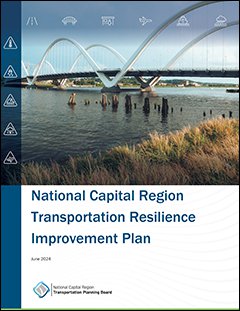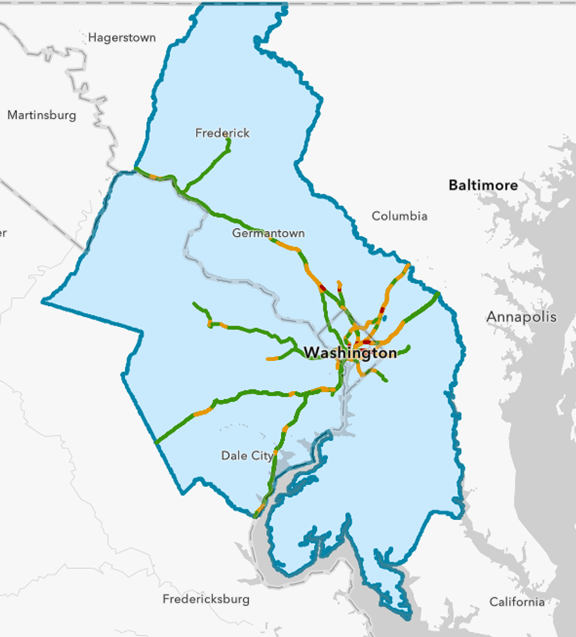Transportation
Transportation Resilience
The National Capital Region is experiencing extreme weather events from heat waves to blizzards to severe coastal storms and flooding. The past decade has seen an uptick in the intensity, frequency, and duration of these natural hazards.
As the region’s population and infrastructure investments grow, these natural hazards pose increased risks to people and the economy. Now is the time to get ahead of these risks, and the TPB is taking action to support regional resilience efforts through research, engagement, outreach, and more.
TPB's Approach to Transportation Resilience
Planning for and adapting to the impacts of extreme weather and natural hazards is critical to ensure the region’s transportation system can operate efficiently and safely. The TPB’s regional resilience planning activities consider vulnerability, risks, and proactive anticipation of natural hazards to maintain service operations and ensure the health and safety of travelers.
The TPB collaborates with its member agencies on decision-making for the transportation network and shares resources to help regional stakeholders progress towards increasing transportation resilience in the National Capital Region.
Transportation Resilience Improvement Plan
 The TRIP, developed in coordination with TPB member agencies, is the first comprehensive regional transportation resilience plan for the National Capital Region. It builds on the strong foundation of transportation resilience work in the region and meets the Federal Highway Administration’s Promoting Resilient Operations for Transformative, Efficient, and Cost-Saving Transportation (PROTECT) program requirements for a Resilience Improvement Plan (RIP). The PROTECT program provides a unique opportunity to access increased funding for improving surface transportation resilience to natural hazards, and the TRIP will position the National Capital Region to be competitive for these funds.
The TRIP, developed in coordination with TPB member agencies, is the first comprehensive regional transportation resilience plan for the National Capital Region. It builds on the strong foundation of transportation resilience work in the region and meets the Federal Highway Administration’s Promoting Resilient Operations for Transformative, Efficient, and Cost-Saving Transportation (PROTECT) program requirements for a Resilience Improvement Plan (RIP). The PROTECT program provides a unique opportunity to access increased funding for improving surface transportation resilience to natural hazards, and the TRIP will position the National Capital Region to be competitive for these funds.
- National Capital Region Transportation Resilience Improvement Plan (TRIP)
Full plan, including executive summary, overview of vulnerability assessment, plan components, prioritized project list, and future planned resilience efforts.
-
Vulnerability Assessment
As part of TRIP development, the TPB identified the region’s most vulnerable transportation assets and locations. The Vulnerability Assessment results also helped inform the prioritization of resilience investments across the region.
-
Project Request Guidance Document
The TPB will continue to collect ideas for projects that plan to enhance the resilience of the region’s transportation system. This resource overviews TPB’s approach to regional resilience planning, helps define resilience projects, and describes TPB’s annual resilience project submission process.
Regional Interactive Resilience Map
 Explore the interactive map of transportation vulnerabilities which includes natural hazard data, transportation assets, and more. The map shows calculated flooding and extreme heat risk scores for transportation infrastructure. Read the Map Companion Text for more information.
Explore the interactive map of transportation vulnerabilities which includes natural hazard data, transportation assets, and more. The map shows calculated flooding and extreme heat risk scores for transportation infrastructure. Read the Map Companion Text for more information.
Resiliency Study Phase 1 (2021 - 2022)
This study benchmarked the region’s understanding of its transportation vulnerabilities, outlined actions TPB could take to increase resilience, and included a series of webinars with tools and resources on transportation resilience for member agencies.
- TPB Resiliency Study (Memorandum) and Whitepaper- These documents synthesize existing resilience activities, summarize regional vulnerabilities to natural hazards, discusses strategies for resilience, and identify potential future resilience planning efforts.
- TPB Resiliency Webinars Resource Guide – This guide provides links to the 2022 Resiliency Webinars and key takeaways/resources from each session for easy reference.
Local Transportation Resilience Initiatives
The TPB relies upon its member agencies to implement most resilience projects and to adopt supporting policies, codes, and standards. The state and District DOTs have jurisdiction over required and prioritized project implementation, such as regular and deferred maintenance and general transportation system improvements and are key implementers.
News & Multimedia
-
News
November 29, 2024
The TPB met on September 18, October 16, and November 20, 2024. Key agenda items included briefs on EV infrastructure implementation, the Regional Air Passenger...
-
News
November 13, 2024
The Transportation Planning Board (TPB) approved Resolution R2-2025 on October 16, 2024, establishing the new TPB Regional Transportation Resilience...
-
News
July 18, 2024
At the June meeting, the TPB voted to adopt an amended resolution pertaining to the inclusion of the I-95/I-495 Southside Express Lanes Project in the Air...